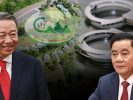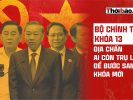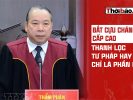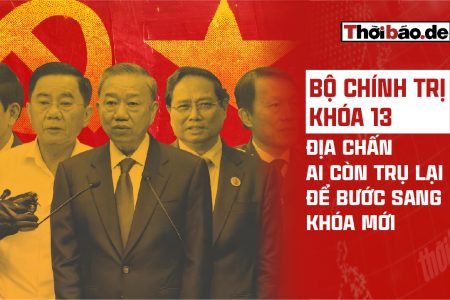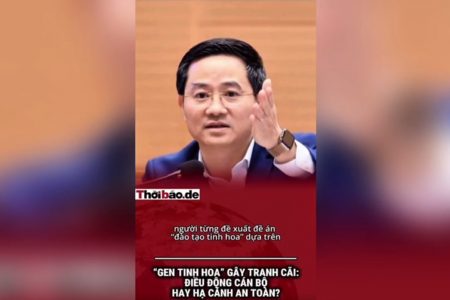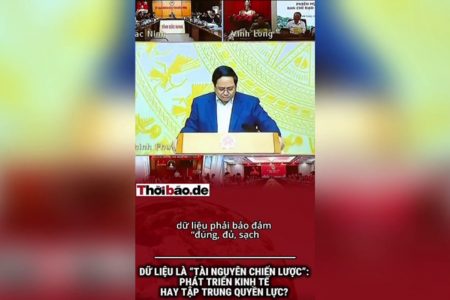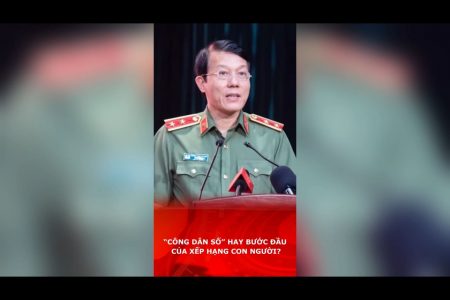
Conducting an invasion of Ukraine under the rather „beautiful“ name of a „special military operation,“ Russia has faced condemnation and the harshest economic sanctions from many countries. Meanwhile, despite speaking out, Hanoi still only repeats symbolic diplomatic statements and avoids condemning Russia. In early March 2022, Vietnam was also among the 35 countries that abstained from voting on a United Nations General Assembly (UN) resolution condemning Russia’s invasion of Ukraine.
Around this issue, RFI Vietnamese interviewed Dr. Nguyen Hong Hai from the University of Queensland, Australia.
*********
RFI Vietnamese: In a recent article, you said that Hanoi is in a diplomatic dilemma because Vietnam has good relations with both Russia and Ukraine. Do you have any further comments on this diplomatic dilemma as well as Hanoi’s abstention from the United Nations Resolution? In your opinion, in this situation, what should Vietnam do?
Yes, as you said, in my article on The Diplomat, I think that Vietnam is in a diplomatic dilemma. Hanoi does not know how to speak and how to balance with both Russia and Ukraine and must consider the consequences later. That dilemma must be opposed to Russia for sending unprovoked invaders to a sovereign country. It is an unacceptable act because it blatantly violates the law and basic principles in international relations, violates the UN Charter, and challenges international public opinion.
Failure to object [Russia’s invasion] would mean accepting a dangerous precedent. However, how to oppose it so as not to offend Russia, the main supplier of strategic weapons to Vietnam. Even to a certain extent, Russia is implicitly considered the last protective umbrella for Vietnam in case there are upheavals. Meanwhile, Vietnam could not help but agree with Ukraine’s stance against Russia’s aggression.
Defending the sovereignty and territorial integrity, against interference in internal affairs and aggression of other countries is a just act. This is a matter of core principles that Vietnam has always upheld and expressed in international relations. But show how to make Russia understand that Vietnam is not on the side of Ukraine against Russia and not let Ukraine understand that Vietnam is „grateful“ for its support during the previous period of the liberation war. In short, it is really an embarrassment for Vietnamese leaders and diplomats when they don’t know how to complete relations with both countries. Moreover, this confusion is also placed in the context of having to take into account the consequences of those statements and actions in the future, if Vietnam is assumed to be in a similar situation to Ukraine today.
I think it is difficult for Vietnam and do not rush to blame Vietnam for abstaining from voting on the UN Resolution. Let’s try to ask each other fair questions like this. The resolution was passed with 141 endorsements. If there are more or fewer Vietnamese votes, the Resolution will still be passed with a majority of votes, right? Meanwhile, there are 5 votes against and Vietnam is not among them. So, why not question whether not being among the 5 votes against means that Vietnam implicitly opposes Russia, while the two sides have a special strategic relationship? In fact, when the overwhelming majority of countries condemn it, Russia is in dire need and saved every voice of support. So, can Vietnam’s abstention from voting against the Resolution understand that Vietnam implicitly opposes Russia?
I share the frustration of many people, including Ukraine’s chargé d’affaires in Hanoi, as reported by the media, with Vietnam abstaining from voting after a “rather strong” statement by the permanent representative of Ukraine. Vietnam joined the UN at the emergency session of the General Assembly. Much of the resolution’s content is about defending fundamental principles of international law, the UN Charter, and humanitarian issues. However, in the Resolution, there are places where the word „condemns“ is used. Therefore, it is possible that for Vietnam, such strong words are sensitive in Vietnam-Russia relations. Therefore, I understand that Vietnam chooses the safe way in this case to abstain.
Each person will have a different interpretation of Vietnam’s abstention. What are the consequences of this abstention, let’s wait for the answer to be placed in Vietnam’s behavior in relation to Russia, Ukraine, Western countries, and the rest of the world. As for China – a neighboring country that, considering its history up to now and probably forever after, has never (I emphasize „never„, even at the best moment between the two countries). communist comrades together, temporarily, if any), there is no territorial dispute. In fact, China is illegally occupying the Hoang Sa (Paracels) and a part of the Truong Sa (Spratlys) of Vietnam in the South China Sea (Vietnam calls it the East Sea) and is always in the position of big fish wanting to eat small fish.
Last week, the Vietnamese Foreign Minister held phone talks with both his Russian and Ukrainian counterparts. This is another move of Vietnam to try to balance. Regarding the relationship of „traditional close friends with both Russia and Ukraine,“ as the Vietnamese Foreign Minister said in the above phone calls, I think that Vietnam is in a special position in relations with the two countries. that few countries have. So Vietnam can do more than we’ve seen so far. However, in the context of the post-voting of the UN General Assembly Resolution and the expectations of the EU ambassadors in a recent Open Letter to Vietnam’s contribution, I regret that so far Vietnam has not been able to promote this special role and position of the relationship, even the content shown in the phone calls as reported by the Vietnamese media.
I think it is true that Vietnam’s diplomacy may have difficulties and dilemmas in the Russia-Ukraine war issue. But this is the time to promote the 14-word motto of Vietnamese diplomacy as Vietnamese Prime Minister Pham Minh Chinh said at the 31st Diplomatic Conference (December 2021) that „Emotion, sincerity, trust reliability, equality, efficiency, and mutual development.” Vietnam’s diplomacy should be „emotional and sincere“ on the basis of the „trusted“ relationship with Russia and Ukraine to promote its contribution to ending the war between the two countries. When the war does not know when it will end, I hope Vietnamese diplomats are smart and wise enough to consider how to promote „emotional and sincere“ in order to contribute a certain „effectiveness“ in this situation.
RFI Vietnamese: Russia’s invasion of Ukraine sets a potentially dangerous precedent and causes concern for smaller countries, including Vietnam. In that context, the handling of the war made many people skeptical about Hanoi’s „bamboo diplomacy.“ Whether this diplomatic method is really effective and calls for the support of other countries in protecting national sovereignty and security if one day China launches an invasion of Vietnam. What do you think about this skepticism?
I think that many people do not really understand the meaning of the phrase „Bamboo diplomacy“ in Hanoi. First of all, „Bamboo diplomacy“ is another discourse and only one of the diplomatic methods, but it is not the contemporary philosophy of Vietnamese diplomacy, and it should not be understood as „policy“ or „diplomacy“ of Vietnam. Diplomacy/policy and diplomacy are two different concepts and issues.
Hanoi’s „bamboo diplomacy“ focuses on protecting national sovereignty and security, which is diplomacy that takes the issue of national sovereignty and security as the root, foundation, and immutable issue. Because it is immutable, no compromise is allowed. But the way of protection is flexible.
As I said above, the consequences of diplomatic behavior, including abstention, let time tell. Moreover, it will depend on movements in international relations between major countries, influential political centers in the world, as well as the wise approach of Vietnam’s diplomacy if it knows how to take advantage of its position especially in relations with both Russia and Ukraine to contribute to the settlement and end of the war.
But, regardless of the diplomatic method, I think that in order to protect national sovereignty and security and be able to fight against all wars of aggression, we must rely on our own strength. Lessons learned in the past and through the current Russian-Ukrainian war show that one must be prepared and should not rely on outside support. The history of Vietnam-China relations, sovereignty ambitions, and China’s rise remind Vietnam to always be prepared. There is a saying that “the best way to avoid war is to prepare for war.”
RFI Vietnamese: Regarding another article written for the Vietnamese media, you cited cultural and historical arguments to explain the war that Mr. Putin launched. If we accept this explanation, Mr. Xi Jinping can do the same with Vietnam. In particular, in the context of the source, Russia called on China to provide economic and military support for the war. Will these make the Hanoi government insecure and how to set up contingency actions, if any?
Yes, as I said above, Russia’s invasion of Ukraine creates and indeed continues, a dangerous precedent in international relations. The purpose of the article about the Russian-Ukrainian war from a historical perspective on the Vietnamese media that you mentioned is so that those who still have illusions and idolize Mr. Putin, believe in what he said when launching the campaign. In this war, let’s re-examine the issue objectively, not letting emotions overwhelm reason and the objectivity of history. Because, when Putin launched the war, he also cited the historical problem.
Regarding the hypothesis „Xi Jinping can do the same with Vietnam„, I think it is not so simple. If people keep thinking like that, the world will be chaotic and soon come to an end. Should not be overly pessimistic, and to go to war, it is not possible to say that today and tomorrow war is right. But I repeat my comment above, that „the history of Vietnam-China relations, sovereignty ambitions, and the rise of China remind Vietnam to always be prepared.“
Regarding your question of whether Hanoi is insecure when Russia calls for Chinese support, I think of course this will have to be in the calculation of Hanoi’s leadership. I take the example of Russia’s oil and gas cooperation projects with Vietnam in the East Sea and other Russian projects in Vietnam, or Russia’s supply of weapons to Vietnam. With such cooperation projects with Russia, what if China „hidden“ aid to Russia and forced Russia to make compromises on these issues? And if so, how will Vietnam react?
These are just assumptions, although we understand that things shouldn’t be oversimplified. Advice to strategic planners is not to take any issue lightly. It is even necessary to make strategic policies even in a fictional case in order to be well prepared for all situations. Do not be ridiculously optimistic like the statements of the Vietnamese Ambassador to Ukraine that the press has also reported.
However, I must also add that it is not easy and simple for China to support Russia. China must understand the price it will pay if it supports Russia, as US President Joe Biden told Xi Jinping during their online meeting on March 17, 2022.
RFI Vietnamese: It is said that it is difficult to justify Russia for the Ukraine war and it is also difficult to agree with the group of people considered the political „elite“ and the people of Vietnam who uphold and support the brutal war acts of aggression of the Russian leader, Putin in modern times. What do you think about this issue?
In this regard, I think there are three aspects here. Firstly, they should not be considered official statements of the Vietnamese government or state in order to have an accurate view of Vietnam’s response. Second, I understand who you mean by the political „elite“ here. Those are several [police and army] generals, right? I think they should not be considered as political „elite“ to avoid misunderstanding. Moreover, they are just retired generals, their statements are personal, have no influence at all, and are not official views representing the state or the agency they work for. Therefore, we should treat their statements like any other public opinion. And, if you notice, almost none of the incumbent generals have spoken about this. They are more cautious than retired generals.
By the way, if I am allowed to comment on the opinions of these retired generals, I believe that they speak according to feelings, dominated by professional thinking, based on incomplete information and one-way, etc. They confuse issues of principle and interest, so they inadvertently create a feeling of promoting an act that violates international law. In particular, to a certain extent, their statement contradicts the official position of the Vietnamese state through the statement of the spokesman of the Ministry of Foreign Affairs of Vietnam, against the good relationship between Vietnam and both Russia and Ukraine.
In January 2022, the Vietnamese leader also sent a congratulatory message to the President of Ukraine on the 30th anniversary of the establishment of diplomatic relations between the two countries. However, some of these comments follow the Russian side’s statement that the Ukrainian government is carrying out a fascist policy and that Russia’s invasion of Ukraine is partly a de-fascistization of Ukraine. I don’t understand when making such comments, did they think about the consequences of those comments in Vietnam-Ukraine relations and affected the reputation of the Vietnamese leadership itself?
Third, say it over and over again, while there are opinions in favor of Russia, there are also opinions that condemn Russia. In other words, public opinion in Vietnam is also multidimensional. I think that is also normal, and it is also normal to argue with each other. As far as I know, there are agencies or organizations in Vietnam that hold seminars on the Russia-Ukraine war and there are also objective views.
RFI Vietnamese thanks, Dr. Nguyen Hong Hai.
Translated by Thoibao.de from RFI Vietnamese: https://www.rfi.fr/vi/t%E1%BA%A1p-ch%C3%AD/t%E1%BA%A1p-ch%C3%AD-%C4%91%E1%BA%B7c-bi%E1%BB%87t/20220323-nga-xam-luoc-ukraina-ngoai-giao-cay-tre-viet-nam

















